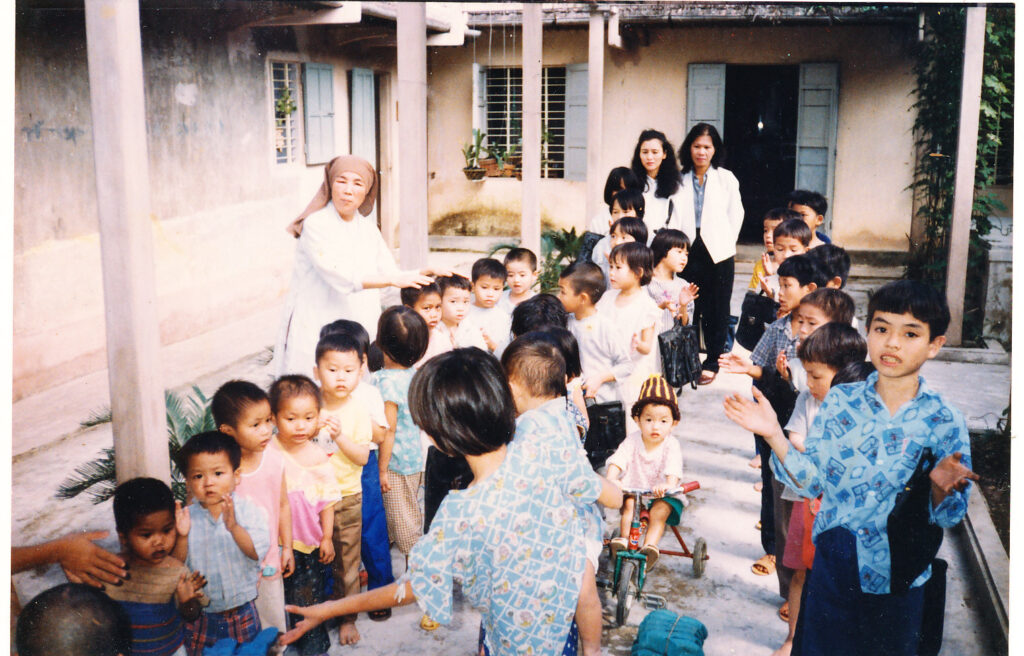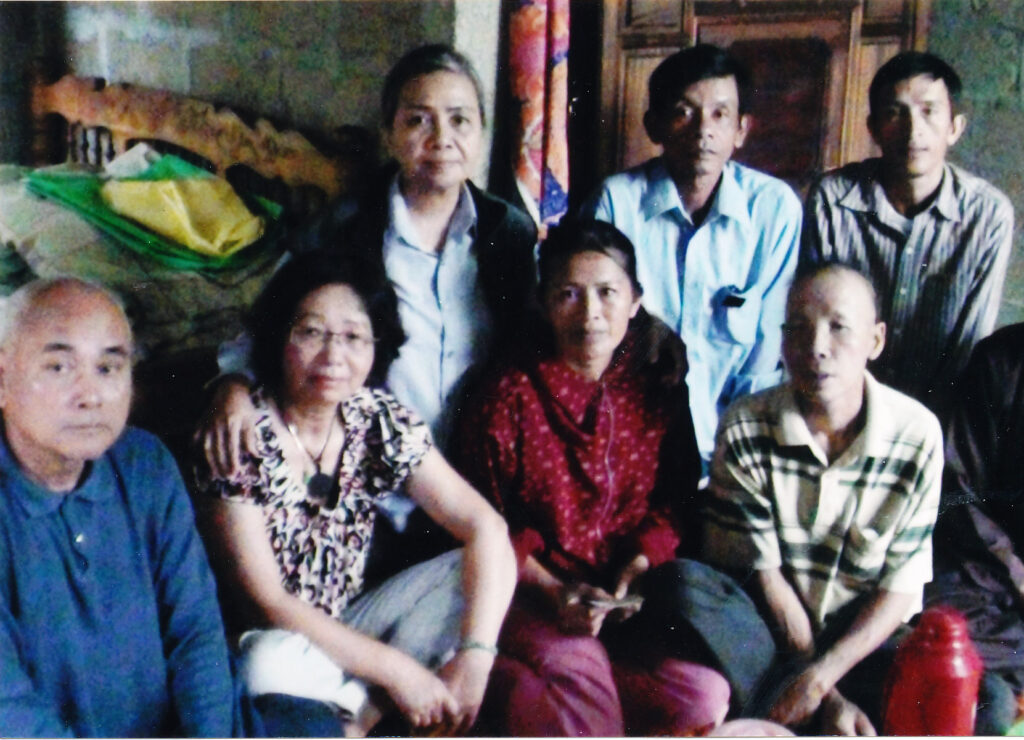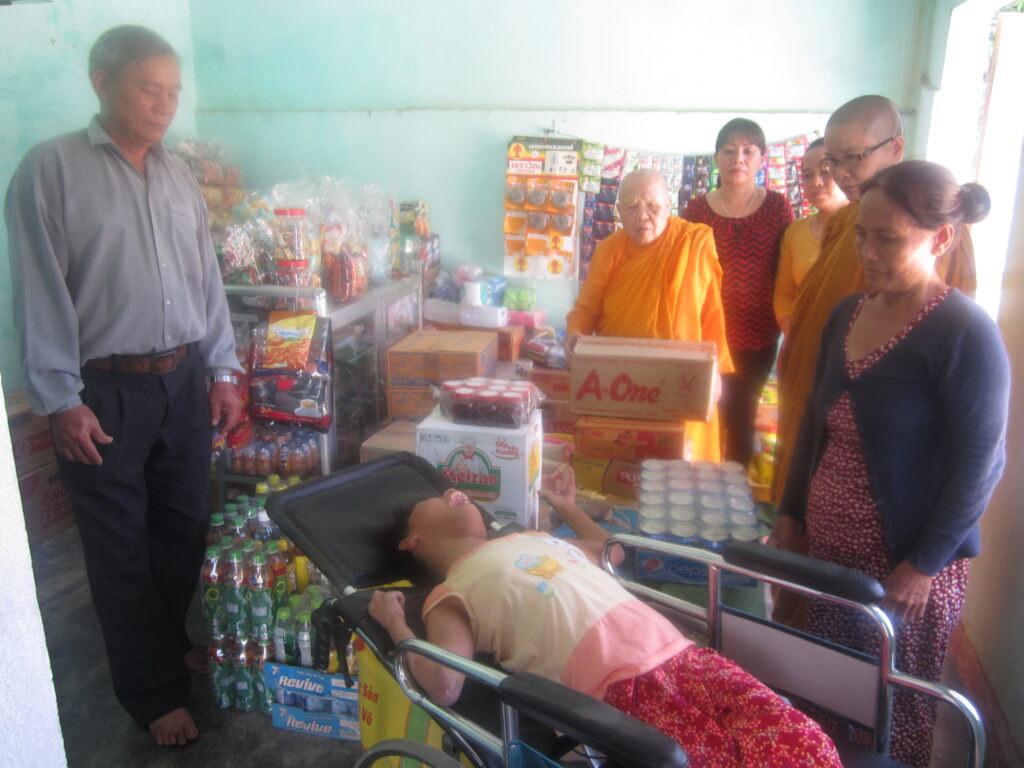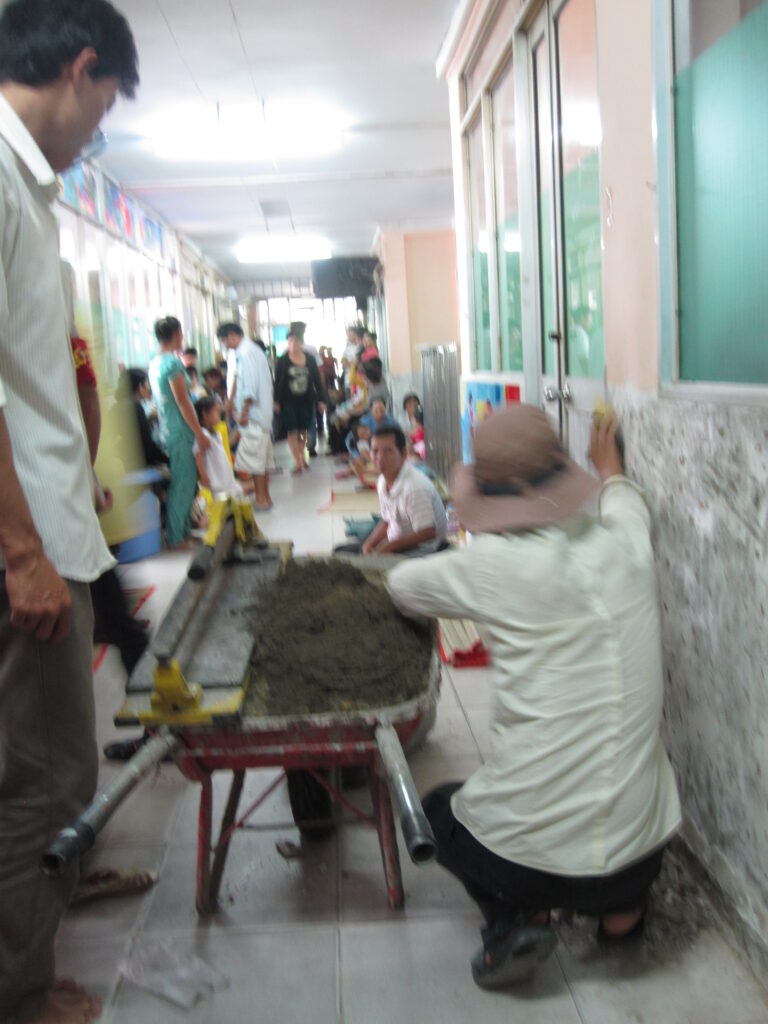
Hello there! My name is Khanh Hien, and I am currently active with the subgroup of the Heart Of Compassion Association, Inc., called Alternate Leadership Team (ALT). To evaluate the effectiveness of HOC’s charity programs, I am traveling back to Vietnam with my father (Director of HOC). This blog will document my first journey through the small, isolated villages through Vietnam. Here’s to the start of a new adventure!
September 4, 2013 | Huế, Việt Nam
I visited a temple turned orphanage today with my parents. The orphanage, named Đức Sơn, is run by Buddhist nuns who view the act of taking care of orphans as a way to practice Buddhism. Many of these unfortunate children were abandoned since birth or orphaned as infants. To make matters worse, some of them are afflicted with physical disabilities and/or mental illnesses.
While conversing with the head nun, Sư Cô Minh Tú, I found that she has an interesting perspective on, at a lack of a better word, childrearing. Instead of viewing the children as humans, she sees them as trees. She explained that while we are short-tempered with humans, we aremore patient and caring towards trees (bonsai enthusiasts, anyone?). Each tree requires soil, sunlight, and water to survive. To thrive, however, they need fertilizer and sometimes pesticide. Besides providing basic food and shelter for the children, the nuns also provide transportation and supplies for them to attend school. Outside of school, the nuns teach them Buddhism and how to positively contribute to society. Basically, the nuns try to make the orphanage as much of a home for the children as possible.
Scanning the walls of the reception room, I could clearly see evidence of their practice. There are photographs of Mid-Autumn Festival celebrations, Tết celebrations, martial arts classes, and dance performances, to name a few. In a small corner hang photographs of weddings and graduations of individuals who once lived in the orphanage. Sư Cô Minh Túsmiled proudly when she mentioned them.
In its first years, the founders of HOC collected donations to help fund this orphanage. Growing up, I’ve heard tragic stories about some of the orphans here. For instance, three men tasked with burying a stillborn baby boy heard the infant crying inside the coffin just moments before the first spadeful of dirt. They rescued the baby and brought him to the orphanage. When my parents asked about him today, Sư Cô Minh Tú replied that he is now married with kids, and working to support his family.
Numerous cases similar to that boy have confirmed the success of this orphanage. I believe it is due to the kindness and diligence of the nuns running the orphanage. They continually aim to apply their Buddhist practice when dealing with the children. Even the testiest and wildest child is an opportunity the practice patience and loving-kindness. I do not know how the nuns do it, but the children are not only healthy and lively, but also well-behaved and incredibly cute. I am sure they will all grow up to be kind and polite individuals who will be grateful for the opportunity to be alive, and to have lived in the orphanage.
September 17, 2013 | Huế, Việt Nam

My parents and I left the house this morning under a grey, gloomy sky. Our destination: a house in the mountains about an hour away via motorbike. As the weather had been mostly cloudy the past few days, I packed along my rain jacket just in case. Sure enough, about a couple hours later rain was pouring in buckets. Luckily when the deluge began, we were safe under the roof of our destination.
The family residing at our destination gave me a glimpse of life’s many difficulties. The father was diagnosed with eye cancer three years ago. The cancer progressed so much the tumor pushed his eyeball out. He underwent intensive radiation therapy until the tumor shrank and his eyeball is inside its socket again. However, due to the treatment’s cost, his two eldest children had to quit school. They began working to help their family pay for chemotherapy and keep the youngest child in school.
After visiting the family, I felt incredibly blessed to live in the US. I never had to worry about quitting school to help my father get treatment or sacrificing my education for a younger sibling. The eldest daughter finished highschool but could not pursue college. The second son had to quit tenth grade so his younger brother could continue elementary school. Living in a country where a highschool (or general education) degree is commonplace, I could barely fathom their situation. As the rain thundered on outside, I tried to hold back my tears at the sight of their mother.
“I couldn’t go to school,” she sobbed. “I want my children to go to school. I am so sad they had to quit.”
I felt so much compassion for her at that moment. With her sick husband, she alone must carry the weight of her entire family. She has to work, care for her family, drive her husband to the hospital for chemotherapy, and figure out ways to pay the debt of the treatment. Even after selling a plot of land, the family is still 105 million VN Đồng in debt. In addition, each chemotherapy session costs an additional 15-16 million VN Đồng. To top it all off, she must deal with the pain of her children’s educational hiatus. Her silent tears fell like the never-ending Huê rain. She wiped her tears, and like Huế city residents donning ponchos, continued braving the storm raging through her life.
September 21, 2013 | Quảng Ngãi, Việt Nam
Yesterday in Đà Nẵng, we visited a temple that also contained an orphanage. The head nun at the temple is a collaborator with HOC. When I walked in, I spotted a few small children. Curious, I followed them to the side of the temple to find several rooms decked with cribs and beds for young children. One room in particular held two rows of cribs and a play pen sectioned off by a metal fence. A handful of toddlers ran about the play pen. A toddler (perhaps a girl) in the crib closest to the door caught my attention. I bent down to pick her up. Before I even touched her, she wrapped her arms tightly around my neck. I immediately hugged her back.
In that instant, a thought crossed my mind. So this is how a child’s love feels like. In that fleeting moment, I felt like a mother coming home from a long day at work. There was relief, tenderness, and love in that tight grip around my neck. In that moment, I could feel her happiness.
I picked her up and held her for some time. Observing her, I can tell she basked in the attention. Eventually I had to put her down, a difficult and heartbreaking task. When I leaned back over her crib, she clung even tighter to me. Even as I placed her on her feet, she leaned against me and refused to let go. Afraid to hurt her, I picked up her up again. Her whimpers broke my heart. I felt terribly guilty of depriving her with such a simple (but rare) comfort as physical contact.
After two attempts at untangling myself from the toddler, one of the volunteers came by and pried her off. Her whimpers escalated into full blown cries. Living in an orphanage with at least one hundred children her age, physical comfort is hard to come by. From my observations, there seems to be about ten kids per volunteer or nun. Just feeding and cleaning up after them takes up a full day, much less finding time to hold each child and giving them individual attention.
September 27, 2013 | Sài Gòn, Việt Nam

Last week I embarked on a week-long road trip from Huế to Sài Gòn. We drove through the fields of rice in central Vietnam, to beach city Nha Trang, to the mountainous Buôn Mê Thuật, to foggy Đà Lạt, to farms of dragon fruit in Phan Thiết, and finally arrived in bustling Sài Gòn.
Through the winding streets of Quảng Ngãi, we visited a family that receives help from HOC. From outside the house’s gate, I heard screams. Coming into the yard, I noticed a sign on the modest house announcing it was a donation from an organization in the city.
Stepping into the house, I saw a girl lying on the floor. Her arms and legs were splayed at odd angles. Her head rolled backward due to the lack of a pillow. She could not talk, only scream, yet she seemed glad to have visitors. We found her all alone on the cold floor. A neighbor ran to fetch her mother from work. While waiting for her mother, we listened to their neighbors recount her story.
Her father abandoned his family upon seeing her disability. The mother, who has no family, must work to provide for her small, broken family. With no one else to rely on, the mother must leave her daughter home alone while she worked. When the mother came home, her daughter began to scream even louder. Her eyes stared at her mother in anger at being left behind.
Since diapers are expensive, the daughter had to lie on the concrete floor so any accidents would be easy to clean up. Her arms and legs were cold from the long exposure. Upon seeing that, my dad ran out to buy her a mattress and covered it with a plastic sheet. When we laid her on the mattress, her eyes lit up in happiness. Before leaving, I bent down and held her hand. Her eyes met mine, and although I had been crying, I managed to give her a crooked smile. She returned with one of her own, beautiful and full of contentment, as if finding joy in the smallest kindness.
October 3, 2013 | Sài Gòn, Việt Nam

Stepping past the gate into the courtyard of Benh Vien Ung Buu of SG, I never felt so claustrophobic in an open space. People flooded the courtyard, sitting on the steps, standing in line, crowded in groups…the air was buzzing with voices. After a few moments of orienting myself, I found a few signs which explained the situation. The majority of the people were in line to register and pay the hospital fee to be admitted.
Following the security guard, I walked through the dingy halls and a flight of concrete stairs to the children’s ward. After hundreds of hours volunteering at UC Davis Medical Center and a student-run clinic, I could not believe my eyes upon entering the children’s ward. An expression of shock, pity, and disbelief registered on my face and remained for the duration of my visit.
The halls and rooms overflowed with patients and caretakers. Along the walls, children laid upon thin straw mats while their parents sat next to them. One child had a saline line attached. His father stood beside him holding the pouch. Metal beds were arranged in every room to maximize space. A thin straw mat covered each bed. The patient laid upon the bed, along with his/her caretaker and all their belongings. On the floor under each bed laid another patient and his/her caretaker. If fortunate enough to be assigned a room, families with their sick children claimed any open space on the floor. Each new sight I witnessed made me appreciate the medical care I receive in the US. Despite its shortcomings, the health care system in the US is many times more advanced and “friendly.” Hospitals are required to treat all emergencies first, then deal with billing after. The reverse occurs in Vietnam and other developing countries. Even on the brink of death, if a patient’s family cannot pay the hospital fee, the patient will not receive medical care.
As I walked through the ward, I noticed families with smartphones and patients playing on tablets. Despite the squalor of the hospital ward, only families with enough money can secure a spot. An epiphany struck me: the varying degrees of “hospitality” reflect the amount each family paid. A bed costs more than the ground beneath it. A spot inside a room costs more than a spot along the corridor walls.
I thought back to the families we visited during this trip. Most of them cannot afford treatment. The patients in the hospital are better off, but not to any greater degree. I realized the extent of suffering in life. HOC is working to alleviate a tiny portion of that suffering. Our efforts really do help the beneficiaries, but there is still a lot of work left to do.
